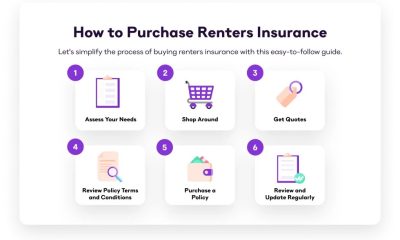Insurance
All About Life Insurance And Why You Need One | Nigeria

A life insurance policy is an agreement between the policyholder and the insurance company. The insurance company is the insurer who promises to pay a sum of money to an authorized beneficiary in the event that the policyholder dies. The policyholder pays a premium for this service.
Life Insurance Policy Types
The life insurance policies in Nigeria come in different forms depending on the preference of the policyholder. Insurance companies like Allianz Nigeria Insurance , IGI insurance Nigeria and the rest who have their license from the National Insurance Commission to sell life insurance policies offer various products. These different types of life insurance products are to meet specific needs or preferences.
- Term life: Term life insurance is a type of life insurance that provides coverage for a specific number of years. As a policyholder, you can specify how long the coverage should last until it expires. In this form of coverage, the insurer will only pay if the insured dies. It is frequently of a long duration. The most popular lengths are 10, 15, 20, and 30 years.
- Level Term: Here the premium payable by the policyholder is the same throughout the policy.
- Single-Premium: This type of Life cover enables the policyholder to pay his policy premium in advance. In this case, You only pay the premium once for the entire duration of the policy.
- Whole Life: This type of insurance cover is a type of permanent life insurance policy that yields cash value. It is often a combination of investment and life cover.
- Burial Expenses: A type of life insurance cover that has a small death benefit in burial expenses.
- Group Life Insurance: An employer purchases group life insurance for the benefit of its employees. It has a modest cost and the sum assured is typically X3 of the employee’s annual income. This form of insurance is compulsory in Nigeria.
- Keyman Insurance: A business usually buys this type of insurance on behalf of a third party who is very important to the operation of a business. This person could be the CEO or an expatriate from overseas.
Some Life Insurance Policy Terms
1. Premium
An insurance premium is a fee paid by the policyholder to the insurer in exchange for a life insurance policy. Insurance underwriters determine the premium based on the policyholder’s gender, age, medical history, occupation, and high-risk habits. All of these components are utilized to determine the insured’s risk profile. The result of this risk assessment is that the larger the risk, the higher the premium. In addition, a percentage of the premium goes toward the insurance company’s running expenditures.
2. Cash Value
When taking out a life insurance cover, e.g. Whole life policy, a portion is saved into the policyholder’s account. The other part is used to purchase life cover. The cash value of a life insurance policy can be any of the following;
- It is a savings account that the insured can use during the term of the policy without surrendering the policy. For example, the policyholder might request for a loan against the policy’s cash value and pay interest on the loan.
- In the event of termination, the gross amount payable to the insured is usually the cash value on the policy and not the total premium paid.
3. Sum Assured
It is the total amount of money that the insurance company guarantees if the insured dies. In this scenario, the insurance company evaluates whether the beneficiary has an insurable interest. They also analyze whether the prospective policyholder meets the company’s underwriting requirements.
Things To Consider Before Buying Life Insurance
Buying life insurance is an important financial decision. One benefit of insurance is the financial security it provides when worst-case circumstances occur. Many people buy insurance coverage in a hurry without fully knowing their needs. You can prevent making incorrect selections with life insurance.
A) Your Needs
- To establish how much insurance coverage you require, you should ask precise questions such as how much of the household income you supply. Who are your dependents?
- How long would your loved ones be able to cope if something terrible happens to you? These questions will help you determine how much coverage you need, how long you need it for, and how much you can spend.
B) Compare Life Insurance Policies
- There are generally two forms of life insurance: First, term life insurance policies usually offer cheaper premiums and a 10- to 20-year term. Second, permanent life insurance offers coverage for the rest of a person’s life (as long as the premiums are paid).
C) Claims Record of the Insurer
- Anyone who intends to buy any insurance should verify the claims settlement record of an insurer. Verify whether the insurer has a good claims payment ratio. Make inquiries to understand why claims are rejected.
D) Affordability of Life Insurance
- Going over why you need coverage can help you choose what type of insurance plan you can afford. It’s essential to determine whether you’ll be able to pay the premiums for the entire period. If you have more extensive insurance needs, you can choose cost-effective protection products.
E) Consult an insurance broker
- An insurance broker will help you factor in your financial considerations along with your needs and dependent’s needs.
F) Age
- The younger you are, the less expensive life insurance will be. The insurance industry is a calculated-risk market. The older a person becomes, the lower their life expectancy. As a result, if you are still young, you can take advantage of lower life insurance rates.
G) Health Status
- In some cases, to get the best insurance rates, you’ll need a medically underwritten policy. This entails your insurer verifying your medical/health history. The better your health, the lower your insurance premiums will be.
H) Inflation
- The impact of inflation can affect the future needs of your dependents. Therefore, you should factor in the effects of inflation before deciding the amount of cover you need.
I) Decide how you intend to pay Life Insurance premiums
- They are different modes available to pay for these insurance premiums. Choose the method most preferable to you.
J) Inform your beneficiaries about your life policy
- Some people hide the facts of their life insurance policy from their beneficiaries for a variety of reasons, including a desire to surprise them. This can cause the benefits of a life insurance policy to go unclaimed. Inform your beneficiaries about your insurer as soon as the policy is issued. Inform them about where they can access necessary documents and records in the event that they need to file a claim. Alternatively, notify your lawyer or a trusted associate.
You can anticipate your future, but you can’t be certain how it will happen. Regardless of how much control you have, the unexpected is unavoidable. People lose their life savings; accidents occur; people die early; and, if you are the only breadwinner in your family and have any of these situations, they may have disastrous effects for your loved ones. In the worst-case situation, your loved ones may be unable to maintain their current way of living.
The least you can do is safeguard your family’s financial future by purchasing a life insurance policy. It is one of the most important financial decisions you will ever make, and it is also quite rewarding. Certain costs associated with life insurance must be evaluated.
Reasons you need to secure your future with an Insurance plan:
Some of the most important reasons why you need one include:
- Dealing with Debt: When a breadwinner dies, their loved ones may find themselves in debt. If you purchase the appropriate insurance policy, you will be able to pay off any outstanding debts such as a home loan, auto loan, or even a personal loan. You’d prefer to spare your family the stress of dealing with money difficulties during a crisis.
- Peace of Mind: When you have a Life Insurance policy, you and your loved ones may rest easy knowing that they are protected from unexpected events. You won’t have to be concerned about their financial future and can relax knowing they’ll be able to retain their existing lifestyle.
- Funerals Are Pricey: Funerals can be quite expensive in this part of the continent. A small life insurance policy will ensure that your final expenses are covered so your family doesn’t have one more worry at an already stressful time.
- Fund Your Retirement Dream: Permanent life insurance policies accumulate a cash value over the life of the policy that can be borrowed with no tax incurred. These policies can fund your retirement plans if your other investments fall short.
- Protect Your Business: Through a life insurance policy, you can insure a key employee, fund a buy/sell agreement or provide a tax-free cash infusion (borrowing against the cash value of a permanent policy). A Life insurance policy is a significant asset to your business.
How much does it cost to register with a Health Insurance in Nigeria?
In a country like Nigeria, with a disorganized health-care system, everyone should have health insurance. We’ve also produced a list of the best ten HMO providers in Nigeria for you. When looking for insurance, price is a major consideration, but various factors influence the cost of health insurance coverage. These aspects are mentioned below.
What determines Health Insurance Costs
- Age: Age is a significant factor in health insurance costs and premiums. The insurance plan becomes more expensive as a person’s age increases. This is mainly due to the elderly’s sensitivity to illness.
- Past Medical Record: Another element that influences insurance rates is one’s prior medical history. A detailed medical history will result in lower rates. A person with more health-related concerns is a larger risk to cover, so health insurance costs may increase depending on the issue.
- Your Occupation: the nature of your job is a deciding factor on the price of health insurance. A person with high-risk jobs will incur more health insurance premium than low-risk occupations.
- Tenure: The duration of a health insurance plan determines if you’ll get costlier health insurance or not.
- The number of persons covered: While there are individual plans, there are plans that can cater to more than one person. The more people a health insurance plan includes, the higher the cost will get.
- lifestyle habits: Certain living behaviors may influence the cost of a health insurance coverage. For example, a smoker is likely to spend more for health insurance than a nonsmoker for the same quantity of coverage.
- Type of plan: Different kinds of health insurance plans comes with different kind of coverage benefits.
How To Buy Life Insurance Easily In Nigeria
The advantages of a life insurance policy, including the financial peace of mind it provides, cannot be emphasized. Some of the benefits of obtaining life insurance include. Financial preparedness in emergencies, a source of income after retirement, and support for loved ones after death. Purchasing life insurance for the first time can be confusing. Purchasing life insurance differs from other types of coverage.
Ways to Buy Life Insurance in Nigeria
Step 1: Determine your need for Life Insurance
- First, examine why you need life insurance. The goal of life insurance is to provide financial support for a person’s loved ones (spouse, children, or parents) after death.
- Life insurance can also be used to pay off debts and financing, as well as to fund retirement plans.
Step 2: Pick a type of Life Insurance.
Insurance policies are classified into two types: term insurance and permanent life insurance. Permanent life insurance has two types: whole and universal. Term life insurance is less expensive than permanent life insurance. Your life insurance needs will determine which form is best for you.
- Term Life Insurance: Term life insurance is low cost and the most common life insurance option for most people. It provides coverage within a specific term, usually 10 – 30 years. It is used to give financial support to beneficiaries.
- If the insured passes away during the term, identified beneficiaries will inherit the sum assured from your insurer. The benefits of term life insurance end once the time is over.
- Whole Life Insurance: This is a permanent life insurance that entails consistent life insurance premiums with accumulating cash value over time. Some whole life policies require premiums from the insured till death and some for a certain number of years.
- Universal Life Insurance: This is the second kind of permanent life coverage. Universal life insurance comes with accumulated cash value and other investment options. This is a suitable plan for those with financial investment interests.
Step 3: Find and Compare Different Life Insurance Offers
- After you’ve determined the type of insurance that would best meet your needs, you must locate and compare prospective insurers. Each company is unique. There will always be differences in benefits, fees, and policies.
- Seek out insurance who offer flexible coverage and personalized policies. You should also evaluate the company’s financial strength, claims process, and customer service. Ensure that their service is high-quality and favorable.
Step 4: Compare Life Insurance Quotes
- Request for life insurance quotes from the selected companies you intend to purchase from. Asking for quotes from your insurance agent will help determine the number of premiums you’ll be paying on your policy. This will help you select the best deal.
- Most companies have a quote generator on their website that’ll allow you to get their quotes. Also, this can be given by their agents. To get a quote, you must provide some personal information.
Step 5: Fill out an Application.
- After selecting the most appropriate coverage from your list, you must submit an application. You will be asked for personal information such as your age, work, gender, and a driver’s license or national identity number.
- Your medical history will also be reviewed for verification, therefore you may be required to produce a doctor’s report. It is useful in establishing the type of rates you will be offered.
Step 6: Prepare for the Insurer’s Medical Exam
- Life insurance companies usually require applicants to get a physical and medical exam before they can be approved for coverage.
Step 7: Wait for Approval
- After your application is processed and the medical examination is completed. The underwriter of an insurance firm decides whether you are eligible for coverage. They also decide what your coverage is. This may take many days, depending on the insurance company.
- If you are eligible, your policy documentation will be forwarded to you for your signing. You will also decide how your premiums are paid.
Conclusion
Life insurance is vital for everybody and everyone. There are numerous insurance policies available. However, you must select an insurance policy that will provide value even in the event of death. Furthermore, many life insurance companies provide investment-linked life insurance policies. This allows you to invest while also protecting yourself from unforeseen risks. The federal government also provides a tax rebate on life insurance premiums.
While you may be concerned about the cost of health insurance, keep in mind that factors such as age and medical history are important to consider when purchasing an insurance coverage. They are beyond the control of an individual. Read through the cost of life insurance article.
Other elements are controllable and can be addressed if one wishes to obtain a lower-cost health insurance plan. However, you should not let a more expensive health insurance plan prevent you from obtaining the necessary health backup and protection for yourself or your loved ones.












